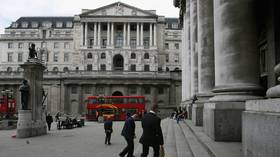Millions of Brits could see savings wiped out – study

British homeowners may have to pay 50% more on their mortgages by the end of the year as a result of the Bank of England’s (BoE) interest rate hikes, the National Institute of Economic and Social Research (NIESR) warned in a new report published on Thursday.
According to the findings, higher mortgage repayments could wipe out the savings of some 1.2 million British families, bringing the total number of insolvent households to 7.8 million, or 28% of the total in the country.
The analysts also calculated that the rising repayments in aggregate will erase 0.3% of the UK’s gross domestic product (GDP) and cost households with home loans a total of £12 billion ($15.2 billion) per year.
The warning from NIESR follows the BoE’s decision on Thursday to raise its base interest rate by 0.5 percentage points to 5% as the regulator tries to tame the persistently high inflation in the country. While annual consumer price inflation remained unchanged at 8.7% in May, core inflation, which excludes volatile energy, food, alcoholic beverages and tobacco, surged to 7.1%, its highest level since 1992.
“The rise in interest rates to 5% will push millions of households with mortgages towards the brink of insolvency,” Max Mosley from NIESR stated. He explained that many families who took out mortgages with interest rates of 1-2% may be in for a rate surge of 4 percentage points.
“No lender would expect a household to withstand a shock of this magnitude, so the Government shouldn’t either. Some investment should be done in forbearance agreements, giving households and lenders the ability to create payment plans that work for each other,” he said.
Since last year, the average variable-rate home loan in the UK has more than doubled from around 3% to 6.19% as of Thursday morning. This has affected around 4 million UK households that either have variable-rate mortgages or are facing the need to remortgage due to their fixed-rate deals ending.
For a household borrowing £300,000 ($381,000) on a 25-year mortgage, monthly repayments have already been pushed up from £1,400 ($1,780) to £2,000 ($2,540), a nearly 50% increase, NIESR calculated, warning that with more interest rate hikes expected, these bills will only grow further.
For more stories on economy & finance visit RT's business section













